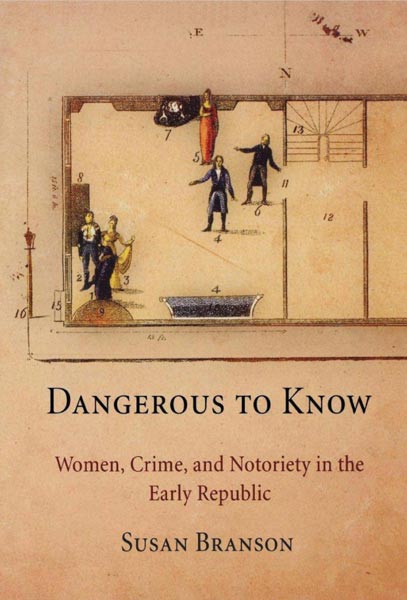 Dangerous to Know Dangerous to Know
Women, Crime, and Notoriety in the Early Republic
Susan Branson
Narrated by Sally Martin
Available from Audible
Book published by University of Pennsylvania Press
In 1823, the History of the Celebrated Mrs. Ann Carson rattled Philadelphia society and became one of the most scandalous, and eagerly read, memoirs of the age. This tale of a woman who tried to rescue her lover from the gallows and attempted to kidnap the governor of Pennsylvania tantalized its audience with illicit love, betrayal, and murder.
Carson's ghostwriter, Mary Clarke, was no less daring. Clarke pursued dangerous associations and wrote scandalous exposés based on her own and others' experiences. She immersed herself in the world of criminals and disreputable actors, using her acquaintance with this demimonde to shape a career as a sensationalist writer.
In Dangerous to Know, Susan Branson follows the fascinating lives of Ann Carson and Mary Clarke, offering an engaging study of gender and class in the early nineteenth century. According to Branson, episodes in both women's lives illustrate their struggles within a society that constrained women's activities and ambitions. She argues that both women simultaneously tried to conform to and manipulate the dominant sexual, economic, and social ideologies of the time. In their own lives and through their writing, the pair challenged conventions prescribed by these ideologies to further their own ends and redefine what was possible for women in early American public life.
Susan Branson is Associate Professor of American Studies at Syracuse University and the author of These Fiery Frenchified Dames: Women and Political Culture in Early National Philadelphia
REVIEWS:
“A rich, detailed account of an illustrative set of crimes and of the fine grain of the emergence of the penny press out of sentimental culture. Branson is to be commended for her scholarly rigor and sophisticated narrative technique.”
—Journal of American History “Branson brings us an account of sex and violence in an era marked by political unrest, social instability, and economic uncertainty ... and urges us to rethink simplistic ideas about gender dynamics and the relative power (and powerlessness) of women at the time.”
—Journal of the Early Republic “A fascinating story that sheds light on gender roles in post-Revolutionary America. Most studies of women in this period almost necessarily focus on the elite. Dangerous to Know goes a few steps lower on the social ladder, allowing us to glimpse the lives of women who, while their values were 'middle class,' had suffered significant downward mobility. As Branson so engagingly shows, these were women who deliberately violated gender conventions even as they strove to retain a veneer of respectability.”
—Sheila Skemp, University of Mississippi
|

